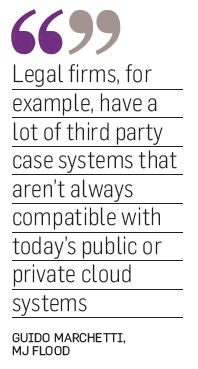Realistic expectations need to be set around cloud computing
Whether you like it or not, cloud computing is happening. But it’s not the easy sell that many IT or internet firms would have you believe.
First of all, there are many different definitions of what cloud computing is. Are you moving to the public cloud (ie, your data and servers are stored in a data centre remotely) or are you moving to the private cloud (ie, your servers and data remain on premises)? Or are you taking a hybrid approach?
According to Brian Larkin, operations director of Irish IT firm HiberniaEvros, which recently announced a €1.6m investment in a new cloud computing division that will create 50 jobs over the next three years including a €500,000 infrastructure platform deal with HP, not every firm is equipped to move to the cloud and realistic expectations need to be set.
He cites a legal firm in the Midlands that moved its entire IT infrastructure to the cloud and ended up losing valuable time every day waiting for the remote servers to be backed up. “In that instance, it wasn’t appropriate to move the entire infrastructure to the cloud. It is critical that you get the right advice before embarking on the cloud journey.
“It’s frustrating. Everything is being called cloud and that is creating confusion in the marketplace. As we see it, there are three tiers to cloud computing: there’s software-as-a-service (SaaS); there’s platform-as-a-service (PaaS); and the area we are most concerned with, infrastructure-as-a-service (IaaS).
“With IaaS, instead of building servers and platforms, that infrastructure exists for you already in a shared data centre. Cloud is simply an alternative methodology for consuming IT.
“If it doesn’t pass TCO (total cost of ownership), my advice is don’t do it. If it is more cost effective, yes. But not all companies meet that requirement. You need to get a return on investment. The key is cost reduction,” Larkin urges.
Inevitability of cloud

“I think cloud is inevitable,” points out Francis O’Haire of DataSolutions. “The typical mistakes that are made include telling firms that all their existing IT is irrelevant and that they need to chuck everything out. The reality is IT is an evolution and you need to upgrade your IT in a structured fashion.
“The other typical mistake is that once you embark on cloud computing it results in an immediate cost saving. That may not always be the case. You may get great flexibility and increased mobility, but you pay for those.
“Firms need to look at what they want to achieve – in some cases, cloud may be cheaper but in other cases your costs could rise. Ask yourself, is your firm ready for it? Why do you need to do it and of course do you have the necessary bandwidth?”
DataSolutions recently deployed its Silverline service to enable the IT channel in Ireland to ensure businesses deliver solutions that provide a return on investment.
“We believe the IT channel in Ireland is best placed to work with companies to deliver IT and services and therefore they need to be empowered with knowledge and security. We’re building a portfolio of cloud services and technologies we’ll bring via the channel to the business community.
“Our advice to the business community if you are embarking on a cloud strategy is do so with a knowledgeable and experienced partner, don’t go it alone.”
According to Guido Marchetti of MJ Flood Technology, businesses in Ireland often underestimate the work required in going to the cloud.
“The cloud will suit some businesses and won’t suit others. Financial organisations are heavily regulated and the cloud as it stands in some cases won’t meet those regulations. It’s important that before you invest in infrastructure or move to an entirely new platform, investigate the implications and benefits.
“Legal firms, for example, have a lot of third-party case systems that aren’t always compatible with today’s public or private cloud systems. Tests need to be carried out to make sure that all your software applications continue to work on the new infrastructure.
“Be confident that service level agreements (SLAs) will deliver. Clearly identify what services you want to run on the cloud and ensure that everything functions better than it had before.”
Going back to Larkin’s point about connectivity, firms need to ensure that they have the broadband bandwidth to handle large file transfers.
“Cloud is an inevitable step, but while it may suit most businesses, it won’t suit all and needs to be thoroughly investigated to ensure everything works properly.”